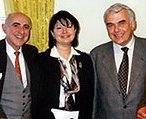
Congressman Jim Moran is a boxer and he likes to talk real tough.
It's all an act. This is a guy who nearly
assaulted an 8 year-old black kid and did something that made his bruise-covered wife call 911 and divorce him the next day. Now he's dissing American troops who just returned from fighting al Qaeda in Afghanistan.
He can beat up women and little black children, but he can't face someone his own size.
At one of Moran's recent town meetings in Alexandria, Virginia, a young sergeant told the congressman he'd returned from Afghanistan and would have volunteered for Iraq had he not been injured. He noted that Moran never attended the welcoming events for the troops in his district, and never wrote them letters as congressman generally do for returning troops.
Moran answered, "that wasn't a question," turned away from the sergeant to look for someone on the other side of the room, and changed the subject.
FLASHBACK: Jim Moran likes to run away from uncomfortable truths. When he was a newly-elected congressman in 1991, his first speech on the floor of the House of Representatives included a call for bipartisanship in support of the previous President Bush, to oust Saddam Hussein's military from Kuwait. He pledged to vote to support Operation Desert Storm.
His party leaders quickly told him what the deal would be if he wanted to get ahead in Congress.
So when the time came to vote, Jim Moran flip-flopped. He sold his vote to the House Democrat leadership and voted against Operation Desert Storm.
This blogger (in those pre-blog days) passed Moran in the street as Moran left the Longworth House Office Building and called, "Nice flip-flop, Congressman!"
Moran, who was with a female companion, said nothing, then turned around red-faced and shouted from across the street, "Well I sure hope you're satisfied!"
I went through the revolving doors into the Longworth building and continued about my business. Halfway down the block-long hall, someone yanked me by the shoulder and swung me around. It was a livid Jim Moran, with furious gray eyes and a drop of spittle on his blond mustache. Having ambushed me from behind, he raised his fist as if he was about to smash my face in.
I was in the company of a Marine and Navy SEAL, and the congressman dropped his fist.
But he talked tough. He demanded to know my name, and when I refused to tell him, he interrogated me about what right I had to be in a congressional office building. (He needed to re-read the Constitution.) He grilled one of my colleagues. Then he grunted and turned away.
Soon afterward, when the
Washington Times reported the incident, Moran got on the radio to spin the story. "It was just a couple of punks," he told WRC Radio.
This punk was a former Senate staffer wearing a three-piece suit. I called the radio station immediately, spoke to the producer and told him I was the guy Moran was talking about. The host announced on-air that one of the punks was on the line, and that he wanted Moran to talk to me.
But Jim Moran ran away. He hung up.
Just like he turned away from the Afghanistan veteran at his latest town meeting.
Jim Moran looks and sounds tough, but inside he's a weakling. He's insecure and he has childlike problems with his temper. If good people confront him honestly and insistently enough, he'll become unglued and finish his political self-destruction. Let's help him do it.




